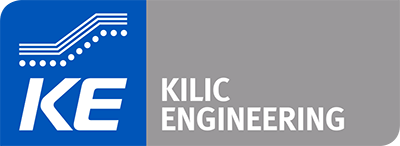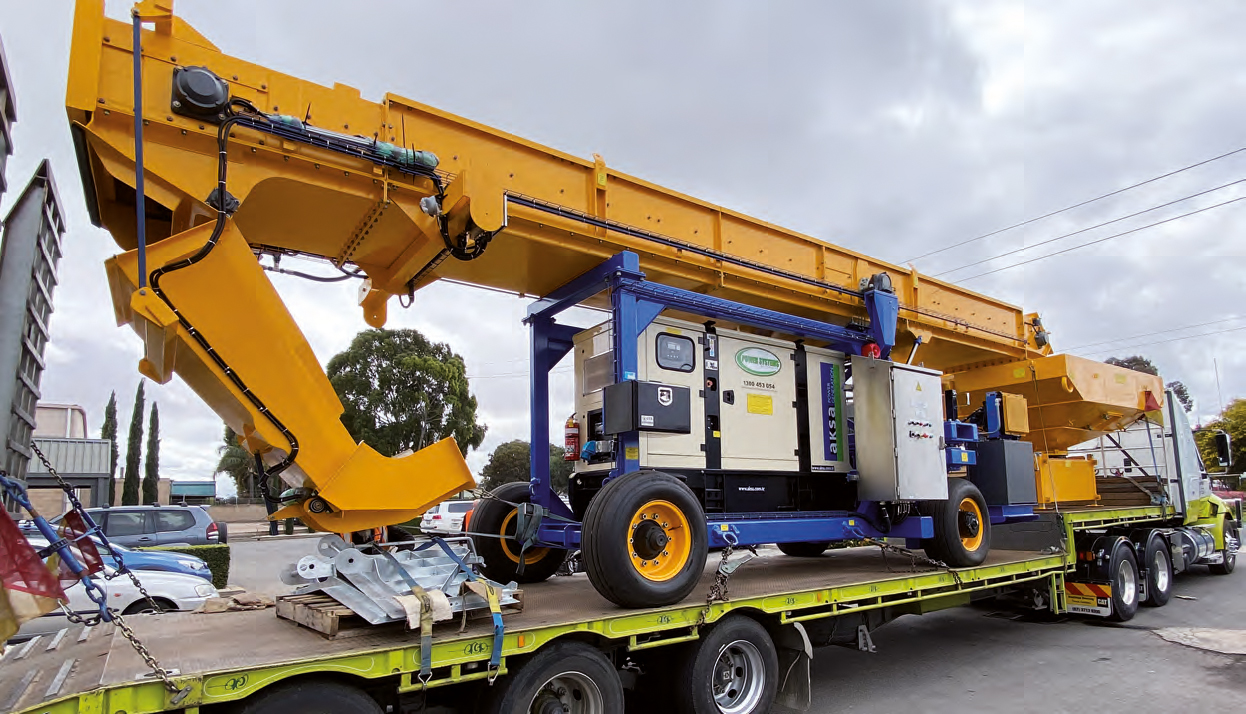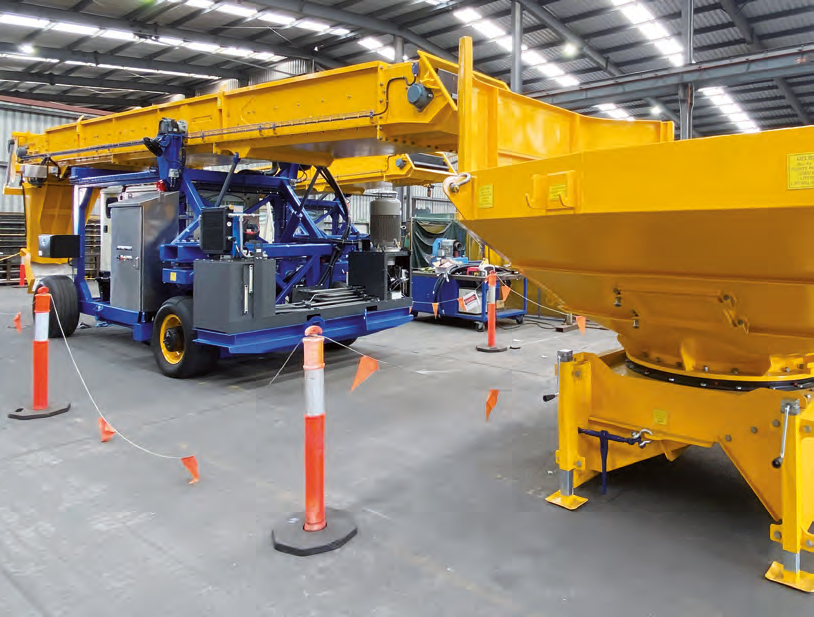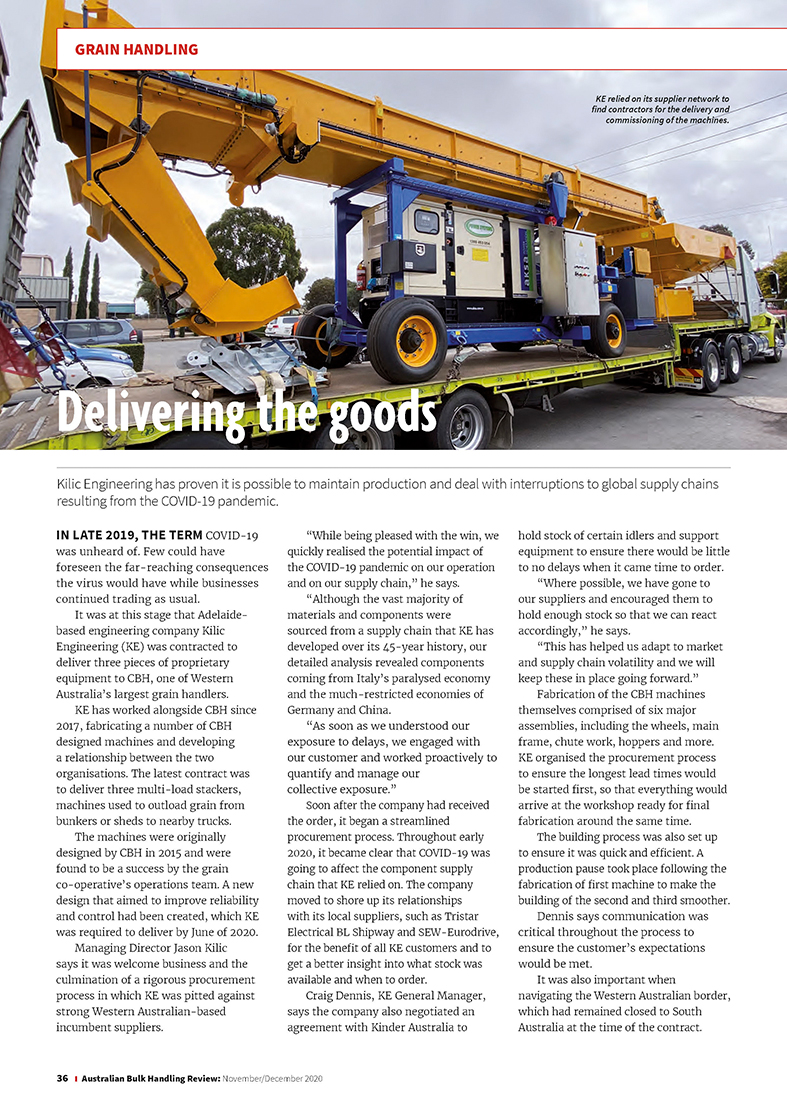Delivering the goods
Australian Bulk Handling Review
Kilic Engineering has proven it is possible to maintain production and deal with interruptions to global supply chains resulting from the COVID-19 pandemic.
In late 2019, the term COVID-19 was unheard of. Few could have foreseen the far-reaching consequences the virus would have while businesses continued trading as usual.
It was at this stage that Adelaide-based engineering company Kilic Engineering (KE) was contracted to deliver three pieces of proprietary equipment to CBH, one of Western Australia’s largest grain handlers.
KE has worked alongside CBH since 2017, fabricating a number of CBH designed machines and developing a relationship between the two organisations. The latest contract was to deliver three multi-load stackers, machines used to outload grain from bunkers or sheds to nearby trucks.
The machines were originally designed by CBH in 2015 and were found to be a success by the grain co-operative’s operations team. A new design that aimed to improve reliability and control had been created, which KE was required to deliver by June of 2020.
Managing Director Jason Kilic says it was welcome business and the culmination of a rigorous procurement process in which KE was pitted against strong Western Australian-based incumbent suppliers.
“While being pleased with the win, we quickly realised the potential impact of the COVID-19 pandemic on our operation and on our supply chain,” he says.
“Although the vast majority of materials and components were sourced from a supply chain that KE has developed over its 45-year history, our detailed analysis revealed components coming from Italy’s paralysed economy and the much-restricted economies of Germany and China.
“As soon as we understood our exposure to delays, we engaged with our customer and worked proactively to quantify and manage our collective exposure.”
Soon after the company had received the order, it began a streamlined procurement process. Throughout early 2020, it became clear that COVID-19 was going to affect the component supply chain that KE relied on. The company moved to shore up its relationships with its local suppliers, such as Tristar Electrical BL Shipway and SEW-Eurodrive, for the benefit of all KE customers and to get a better insight into what stock was available and when to order.
Craig Dennis, KE General Manager, says the company also negotiated an agreement with Kinder Australia to hold stock of certain idlers and support equipment to ensure there would be little to no delays when it came time to order.
“Where possible, we have gone to our suppliers and encouraged them to hold enough stock so that we can react accordingly,” he says.
“This has helped us adapt to market and supply chain volatility and we will keep these in place going forward.”
Fabrication of the CBH machines themselves comprised of six major assemblies, including the wheels, main frame, chute work, hoppers and more. KE organised the procurement process to ensure the longest lead times would be started first, so that everything would arrive at the workshop ready for final fabrication around the same time.
The building process was also set up to ensure it was quick and efficient. A production pause took place following the fabrication of first machine to make the building of the second and third smoother.
Dennis says communication was critical throughout the process to ensure the customer’s expectations would be met.
It was also important when navigating the Western Australian border, which had remained closed to South Australia at the time of the contract.
“Previously we’ve supported CBH with our own workers, which has worked well but wasn’t feasible,” Dennis says.
“In this case, we relied on our supplier network to find contractors that could potentially work for us. After a due diligence process, we entrusted Avon Valley Mechanical for the delivery and commissioning of the machines.
He adds that the experience has tested KE’s communications skills and helped improve some of the ways the company stays transparent.
“While it has been a challenge, we’ve also learned a lot from it,” Dennis says. “Integrity is one of our core values, and this has shown us just how important it is.
“Open, honest communication has helped us when working with subcontractors, suppliers and the client – and will remain a core part of how we run the business going forward.”
Australian Bulk Handling Review, December 2020
Click on the image to view the original article as a PDF.




